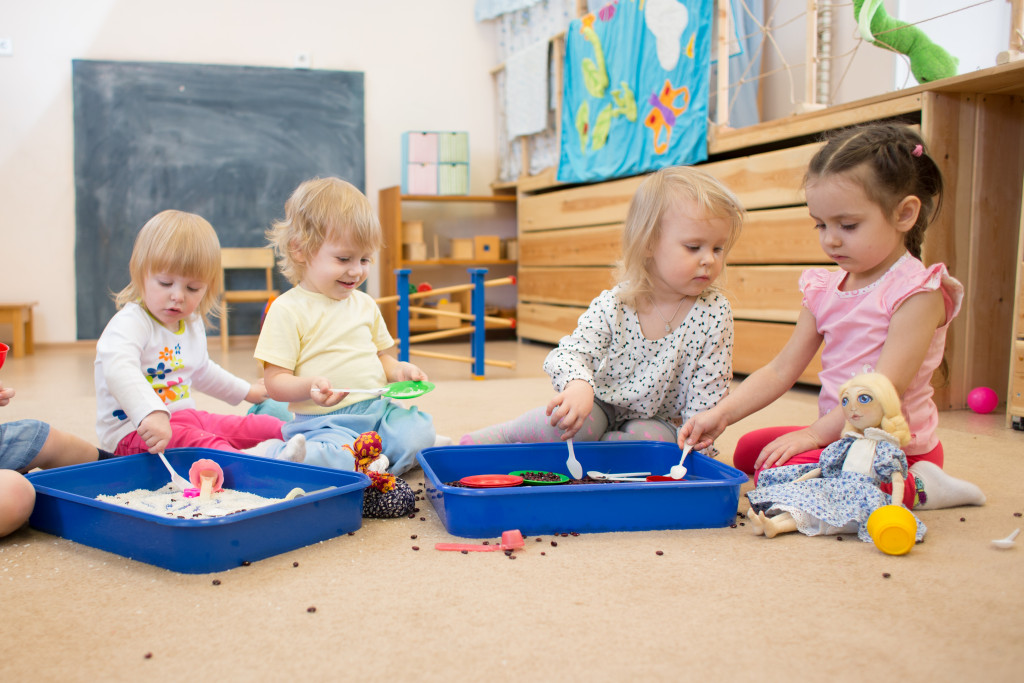- Promote active learning and play through outdoor games, puzzles, and hands-on projects.
- Advocate for Montessori education within your community’s educational institutions.
- Cultivate strong communication skills with storytelling sessions or public speaking workshops.
- Engage in real-world experiences such as field trips and community service activities.
- Foster a curiosity-driven environment to foster critical thinking, problem-solving, and creativity.
In today’s rapidly evolving world, cognitive skills are crucial in shaping a child’s ability to think critically, solve problems, and adapt to new challenges. As a community member, you have a unique opportunity to contribute to developing these essential skills in children around you. By providing the right environment, engagement, and guidance, you can help nurture young minds and set them on a path to success. This guide outlines five practical strategies to boost cognitive skills in children within your community, empowering them for a bright future.
1. Foster a Curiosity-Driven Environment
Children are naturally curious; fostering an environment encouraging this curiosity is key to enhancing their cognitive skills. Create spaces where kids can explore, ask questions, and engage with their surroundings. Encourage open-ended conversations, ask thought-provoking questions, and provide access to various resources, such as books, puzzles, and educational toys. When children can explore their interests, they develop critical thinking, problem-solving, and creativity.
Moreover, organize community events like science fairs, art exhibitions, or storytelling sessions to stimulate their curiosity further. These activities provide platforms for children to showcase their talents, collaborate with peers, and explore new areas of interest, thereby boosting their cognitive skills.
2. Promote Active Learning and Play
Active learning through play is a powerful way to enhance cognitive skills. Here are some tips on how to promote active learning and play:
Create a Game Night
Game nights encourage everyone in the family to participate in an activity together while developing critical thinking and problem-solving skills. Try different games, such as word search, strategy board games, or memory games, to keep things interesting. You can make your own game night by creating puzzles using newspaper clippings or magazines.
Outdoor Adventures
Organize challenges and scavenger hunts in the backyard, park, or neighborhood. These activities will encourage active exploration and outdoor play for children of all ages. An important part of this type of activity is to set achievable goals that can be measured, such as reaching a certain destination or gathering specific items on a list!
Indoor Activities

Board games and puzzles are excellent tools to promote cognitive strategies in a fun way! Try introducing card games like UNO, Memory Match-Up, or Concentration. Jigsaw puzzles and word searches also help children practice logic and problem-solving skills from home. They can even create their own puzzles by cutting out pictures from magazines!
Hands-On Experience
DIY projects are a great way to engage children in active learning through play. Gardening, cooking, and arts and crafts require concentration and motor coordination. These types of activities can also teach important life skills while allowing children to explore their creative side. Try having your little ones help with dinner or baking a cake together. You can even make your own crafts with recycled materials to create unique works of art!
3. Encourage Montessori Education
Montessori education is a holistic approach emphasizing self-directed learning, hands-on experiences, and individualized instruction. Consider advocating for professional Montessori education within your community’s institutions. Montessori classrooms allow children to choose their activities, encouraging them to follow their interests and learn at their own pace.
Additionally, support the creation of Montessori-inspired learning spaces at home or in community centers. These environments are designed to stimulate exploration and creativity, promoting cognitive development. By embracing Montessori principles, you empower children to become independent thinkers, problem solvers, and lifelong learners.
4. Cultivate Strong Communication Skills

Effective communication is a fundamental cognitive skill. Organize storytelling sessions, debates, or public speaking workshops where children can express their thoughts and ideas. Encourage active listening and provide constructive feedback to help them improve their communication abilities.
Furthermore, introduce them to the world of arts — be it writing, painting, music, or drama. Artistic endeavors allow children to express themselves creatively, enhancing their cognitive skills by encouraging self-reflection, interpretation, and emotional intelligence.
5. Engage in Real-World Experiences
Exposure to real-world experiences broadens a child’s perspective and enhances cognitive skills by connecting theoretical knowledge to practical applications. Organize field trips to local businesses, museums, farms, or community projects. These experiences introduce children to various aspects of life, helping them relate classroom learning to real-life situations.
Encourage them to volunteer or participate in community service activities. In doing so, children learn empathy, problem-solving, and the value of contributing positively to society. Engaging in such experiences fosters a holistic cognitive development that goes beyond textbooks.
In Summary
Enhancing cognitive skills in children within your community requires a combination of engaging activities, supportive environments, and a commitment to their growth. You play an instrumental role in shaping children’s cognitive abilities by fostering curiosity, promoting active learning, encouraging Montessori education, cultivating communication skills, and exposing children to real-world experiences. Remember, every effort you make today contributes to building a brighter tomorrow for the children in your community.




